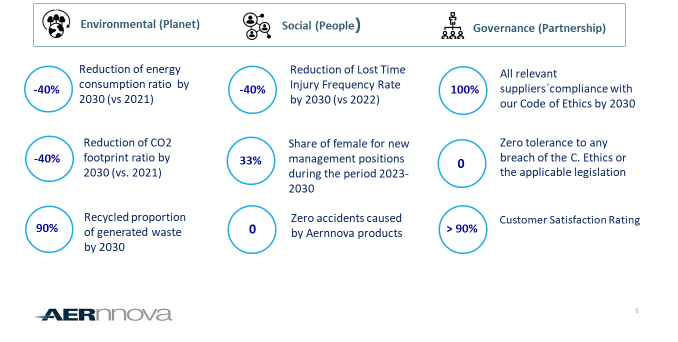When we think of Sustainability, the first thing that comes to our mind is everything related to caring for the planet, measures against climate change, greenhouse gases… Indeed, that is correct, but Sustainability is not only this, but also includes other factors related to workers, human rights and company ethics, among others.
The most widespread definition of sustainability is “the satisfaction of current needs without compromising the ability of future generations to meet theirs, ensuring a balance between economic growth, environmental care and social welfare”.
To analyze the sustainability of a company, it must be evaluated in the following scopes.
–E for Environment. This refers to relevant issues such as climate change, greenhouse gas emissions, energy management, rationalization in the consumption of water and other raw materials, and the management of hazardous and non-hazardous waste.
–The S for Social. Here we address issues related to human rights, labor relations, equality, diversity and inclusion policies, and occupational risk prevention. The social aspect not only refers to workers, but also includes other impacts on the communities in which we operate, and with respect to our customers, such as the safety and quality of our products.
–G, Governance. This area refers to aspects related to the code of ethics, transparency, compliance, controls and procedures, risk management, tax strategy, cybersecurity, relations with third parties and customers.
It is often said that Sustainability can be reached through one of the three Cs: Convenience, Compliance or Conviction.
In the case of Aernnova, it is a firmly belief. Care for the environment and commitment to safety and quality are part of our corporate DNA. Designing and building lighter and more efficient aircraft, developing new materials and technologies to achieve zero-emission aircraft, caring for our workers, and the quality of our products, are the principles that govern the company’s decision-making and strategy.
To develop the sustainability strategy, align priorities with what our stakeholders (employees, shareholders, community, customers and suppliers) require from us, and contribute to the achievement of Sustainable Develpment Goals set up by the United Nations, Aernnova has established an Action Plan with 9 main goals, their KPIs and a time horizon 2030.
Each objective has lines of action with their corresponding metrics to evaluate performance.
ENVIRONMENTAL OBJECTIVES 2030
Faced with the challenge we have set ourselves to reduce energy consumption with respect to turnover by 40%, we need everyone’s involvement to use energy in a responsable way, and at the same time improve processes and detect inefficiencies.
We also have an ambitious goal to reduce our carbon footprint by 40%, which we can achieve by increasing the use of renewable energies and self-consumption, with the installation of photovoltaic panels.
To this end, training is planned for 2023 in Energy Awareness, to promote the cultural change that will make Aernnova an energy sustainable and efficient company, for example, by committing to sustainable mobility to reduce the environmental impact of our transportation and travel.
Also, to increase the percentage of recycled waste, we will increase the use of recyclable and/or returnable materials in packaging and other auxiliary materials and other actions, such as composting organic waste in rest and dining areas.
SOCIAL OBJECTIVES 2030
Aernnova has a firm commitment to the safety and health of all employees, and through implementation plans and specific training, we are working to reduce the Occupational Accident Frequency Rate by 40% by 2030.
We are committed to Equality and active policies to create a more diverse, egalitarian and inclusive company. This includes the goal of achieving a minimum percentage of 33% female presence in new vacant management positions in the 2023-2030 period.
A key objective of our Quality System is to maintain Zero accidents caused by Aernnova products. For this, as an intrinsic part of the management system, it has tools for detection and prevention of defects with risk in Aviation Safety. To mention a few, these would be APQP, 6 Sigma program, Akrimas, risk management.
Reinforced assurance mechanisms will be added soon, in line with Safety Management System regulations.
GOOD GOVERNANCE OBJECTIVES 2030
We want to partner with our suppliers to extend our principles to the entire value chain, for which we will require our most relevant suppliers to comply with our Code of Ethics and we will promote auditing systems to monitor their effective compliance.
Aernnova is committed to respecting its Code of Ethics, applicable legislation and industry standards, and therefore requires its employees and other stakeholders to be transparent and fair in the performance of their tasks, complying with the law and the ethical principles of the organization.
Maintain the Customer Satisfaction indicator above 90%, as has been sustained in recent years, even reaching 91% in 2021.
In this journey to sustainability, we have a roadmap to achieve the commitments that have been set, in which all Aernnova employees are involved. Each one, from his or her position or function, has in his or her hand to contribute to the fulfillment of the corporate objectives.
Sustainability criteria must be strongly rooted in our corporate culture, and we must be aligned to extend it to the supply chain and suppliers, collaborate with our customers and between all of us, meet the objectives of the EU Green Deal, and ensure the achievement of the established goals.
We must be aware that we are not only part of the problem, but also part of the solution. We have to take action, we have a lot at stake.





